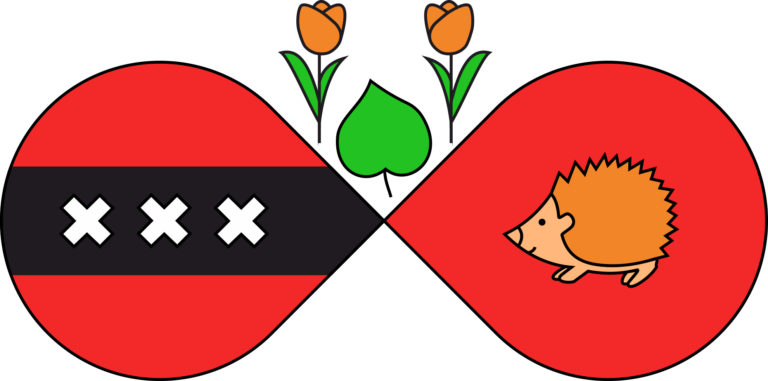6.–13. dubna 2022 se někteří žáci z 6A8, 7A8 a 5A6 zúčastnili výměnného pobytu s nizozemskou školou Cygnus Gymnasium v rámci projektu Erasmus+. Mezi největší přínosy patří obohacení v rámci sociálně-kulturních zkušeností; znalosti týkající se oběhu pitné vody v Nizozemí a spolu související historie.

Thursday, April 7th:
After we had arrived at the school, the Dutch pupils guided us through their school. We noticed a few main differences in comparison to our school, for example, each floor is designed to use for a single subject. The social activity program followed the school tour. It consisted of the Marshmallow Challenge, whose goal was to cooperate in international groups to find the best solution for building the highest tower of limited kinds of items, and a quiz about Amsterdam prepared by Dutch pupils. This activity was being completed again in international groups, and we learned a lot of new information. Shortly after, we headed out of the school to discover the city itself. The Dutch pupils guided us and told us about the sights and other places we went to nearby. We regrouped at the Central station to cross the river, to get to Amsterdam Noord. We had a unique opportunity to see the city from above – we got onto the lookout tower ADAM. After the return to the school, we hosted a dinner. The program ended with music on guitar and piano.
Friday, April 8th:
Firstly, the bus took us to Zaanstad – a city nearby Amsterdam. There, we visited a local town hall. We have even seen the council room, where Mr. F. Hoedemaeker told us about political decisions they make to maintain a clean environment and sustainability. We took a quick look through the Zaanstad and headed with the bus to Zaanse Schans. There were a lot of windmills. In some of them, there was an illustration of traditional handcrafting like cheese production or shoemaking. After that, we experienced something entirely new for us – Poldersport. It is a common way of entertainment for the Dutch. The goal of this activity was to overcome obstacles in water during difficult conditions: cold, tiredness, stress, and anxiety. Those, who were waiting, or those, who had passed a level, were mentally supporting the others. It was one of the unforgettable experiences.
Saturday, April 9th:
On this day, each of us had an individual program. Somebody has visited a museum, others went on a boat tour, or met with the Dutch partner’s family.
Sunday, April 10th:
We went pretty far to the Velsen. There we visited a steelworks museum of Tata Steel company. Dhr. Moene has given us an explanation of using non-renewable sources of energy. A walk in a rare biotope – sandy dunes – followed the program in the museum. Dhr. Van der Geest (Ph.D.) from the Institute for Biodiversity and Ecosystem Dynamics, Aquatic Ecology and Ecotoxicology University of Amsterdam explained the circulation of water, sand, and endemic plants. We spent the rest of the day at the nearby beach.
Monday, April 11th:
We visited an impressive museum in Leiden – the Leiden Naturalis Museum. One of the staff gave us a lecture about the evolution of species, followed by tasks for pairs. However, all the program was in Dutch. Fortunately, the Dutch pupils translated everything we needed to help process the assignments. As soon as we had left the museum, we had some free time to visit the city and have a quick lunch. In the afternoon, we headed to a historical pumping station, where we received information about managing the flooding problems in the Netherlands.
Tuesday, April 12th:
All the program was in Cygnus school. Firstly, we were on a Dhr. Burger’s lecture about cleaning the drinking water in the Netherlands. We have spent the rest of the morning working on presentations for the rest of the morning. After the free time in the afternoon, the Dutch parents came to the school to view our presentation. We noticed some of the essential skills for a successful performance. Those were the teamwork, having no fear of speaking in public, and sometimes the ability to improvise. These moments were the last we could spend with the Dutch pupils. We said our farewell and went back to the Czech Republic.
Acquisitions:
Among acquisitions for participants of the project belong cultural and social experiences, knowledge about the circulation of water in the Netherlands, its history, some of the problems with sustainability and their solutions, and a lot more.
Štěpán Taláček








